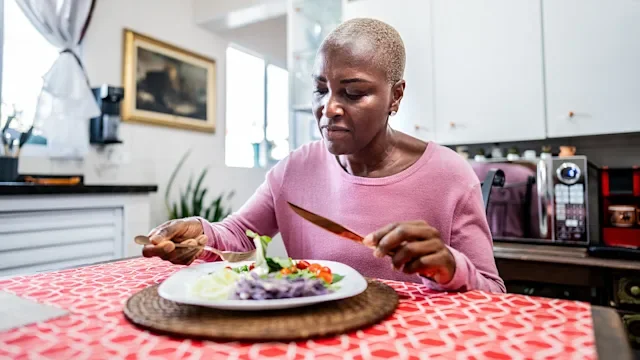Key takeaways:
Jean Franzblau experienced a complete loss of libido when she entered menopause.
She says the loss of sexual desire was devastating. It felt as if she had lost a key part of her identity.
Estrogen medication helped her boost her libido and get her sex drive back.
When Jean Franzblau entered perimenopause at age 47, she thought she knew what to expect. She had heard all about hot flashes and erratic periods. But for her, the worst symptom was one nobody warned her about: a complete loss of sex drive.
“It wasn’t low libido, it was zero libido,” Jean says.
While a loss of desire sometimes happens during menopause, Jean was not prepared for it. She was left feeling devastated.

Jean eventually recovered her libido with the help of estrogen replacement therapy and by changing her thyroid medication. But she hasn’t forgotten what the loss was like.
Today, at age 53, her life’s work has become helping people embrace sexual health. In addition to starring in her one-woman show, “My Mother Doesn’t Know I’m Kinky,” she works in Los Angeles as a certified intimacy coordinator, helping TV and film productions execute intimate scenes smoothly and safely. And she’s the founder of Cuddle Sanctuary, an organization dedicated to teaching cuddle therapy and how to lead cuddle events.
Navigating a devastating loss of libido — and identity
For Jean, an unexpected loss of sexual desire was the worst part of perimenopause.

“There is a pleasant pulsing sensation between my legs that I feel especially in the morning; it’s something I count on as being me. And during this period of low libido, it died to nothing,” Jean says, comparing the shift to a person with a penis suddenly going months without an erection. “Who I knew myself to be was falling apart.”
That loss of desire was also tough on her relationship, Jean remembers. “We were two people who valued our sexuality greatly,” she says. “And when this started to change, there was confusion and a sense that there must be something wrong with our partnership.”
Medication helped her get her groove back
It took some experimentation for Jean to find a solution. She visited a functional medicine specialist who suggested maca root, a natural supplement often used to support hormonal balance. The maca root offered a small amount of relief at first, but not much. Then, it stopped working altogether.
What’s it like to have a sexual awakening at 70? Read about one woman’s late-in-life sexual awakening, which taught her it’s never too late to enjoy a satisfying sex life.
What’s considered a normal sex drive? There may be no such thing as a “normal” sex drive, according to experts.
Can natural supplements boost your libido? Here are some you can try and some to avoid.
Jean had heard estrogen replacement therapy could restore libido, so she asked her doctor about it. But her doctor explained it was only FDA approved to treat certain symptoms, like hot flashes. Only when Jean said she was also having hot flashes did her doctor write her a prescription for an estrogen patch.
The estrogen patch wasn’t an instant cure. It took 6 months of tweaking the dosage before her sexual desire began to come back. And Jean says she thinks switching her thyroid medication might have also played a part.
After having a complete thyroidectomy (thyroid removal) at age 42, Jean had tried several different brands of desiccated thyroid medication over the years. During menopause, she switched to levothyroxine to treat her low thyroid hormone levels. She says she made the change because she wanted better results across the board, including higher energy levels.
- Vivelle-DotDotti and Estradiol
- ClimaraEstradiol
- DivigelEstradiol
Today, Jean says, she feels sexually healthy again. “It’s not like it was in my 20s,” she says. “But at least I recognize myself.”
Why families need to have conversations about sexual health
For Jean, one of the hardest parts of navigating her loss of desire was that nobody had prepared her for it. Like many mothers and daughters, she and her mom never had deep discussions about menopause or other aspects of sexual health.
Jean doesn’t want other people to experience what she did. She urges families to talk openly about sexual health and go beyond the usual, brief discussions about periods and contraception. She says the dialogue should include topics like sexual identity, sexual health during different life stages, and more.
Encouraging honest conversations and more openness about sexual health and expression are key missions of Jean’s solo show. “Some of the themes include sexual consent and repair between family members, along with reclaiming a sense of sexual identity and healing,” she says. “And there are lots of laughs.”
Jean’s relationship with her own mother is much more open than it used to be. She says the two of them have had in-depth talks about sexual health that they weren’t able to have when she was younger and her mom is fully on board with her show. In fact, Jean’s mom gave her blessing for every line that the character who’s based on her speaks.
Kink is all about safety and consent
Jean has been involved in bondage-discipline, dominance-submission and sadomasochism (BDSM) for about 15 years. She says one of the signs that her libido was flagging was her diminished interest in kink. “It was like the canary in the coal mine,” she says.
For a while, activities that normally turned her on felt like chores. But now that her libido is restored, she says, she’s enjoying every aspect of her sex life again.
Jean stresses that safety, consent, and risk awareness are crucial in any BDSM practice and that boundaries must be set and negotiated beforehand. “We all deserve to experiment and be curious without shame, as long as we’re honoring consent,” she says, adding that kink isn’t for everyone. “I invite people to pay attention to their own joy and their own pleasure.”
Tips for people with low libido and their partners
Jean has five tips for people who are dealing with a loss of desire during menopause and their partners.
1. If you’re grieving, know that it’s appropriate
A loss of libido can cause deep sadness and grief. Jean says it’s important not to minimize the loss.
2. Be flexible
“Anxious minds don’t have yummy experiences,” Jean says. “My partner has learned to say, ‘Maybe we’ll be intimate. We’ll see.’” Because she doesn’t always know how she’ll be feeling in a few hours, she explains, it helps to leave room for different possibilities.
3. Reduce pressure around arousal and climax
Jean recommends enjoying a wider palette of touching, cuddling, and sensual play without having a goal in mind. “Treat arousal like a butterfly,” she says, pointing out that, for her, the fleeting nature of arousal makes it all the more precious. “When climax is off the goal list, our options increase exponentially.”.
4. Ask for what you need from health professionals
“It’s possible your doctor might not take your symptoms seriously,” Jean says. “Be your own advocate and know that you deserve relief.” If your current healthcare professional can’t address your concerns, she adds, it may be necessary to find one who can.
5. Find support
“It might be healing to talk to your sisters,” Jean says, referring to other women. “Talk about it in community if there are safe people you can share with, instead of going through it alone.”

Why trust our experts?

















